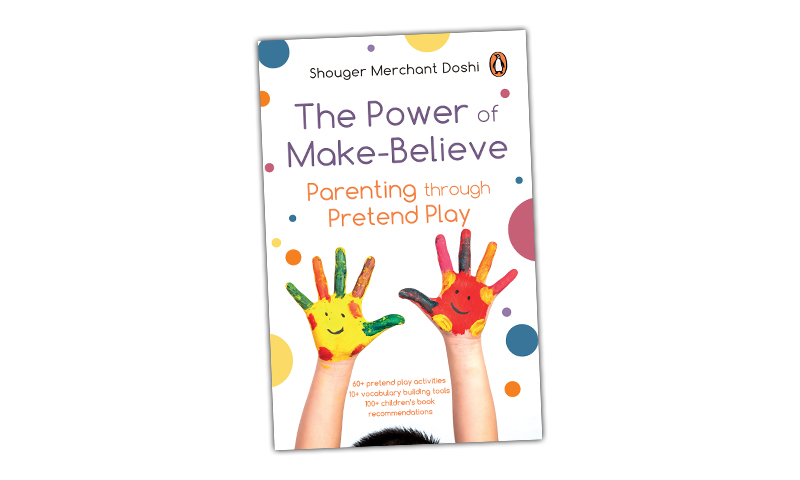Shouger Merchant Doshi is a former journalist and lawyer and has also co-founded two incredibly creative companies. The first is called The Story Merchants, which manufactures children’s educational products based on pretend play activities, and the second, The Pinwheel Project, is an events company making children’s products and services accessible across India. She has written an incredibly practical book called The Power of Make-Believe: Parenting through Pretend Play that both kids and their parents will find equally enjoyable. Published by Penguin India, this well-researched book outlines that pretend play and purposeful discussions with parents accords children the gift of vocabulary and creativity that leads to effective communication skills, something that will benefit them throughout their life and career. In a conversation with the Higher Education Digest, Shouger Merchant Doshi talks about today’s parenting challenges, her inspiration for writing this book, and shares some important tips for parents and aspiring writers.
What are the major challenges parents are facing today?
Parents face plenty of challenges on a daily basis which is especially compounded with uncertain times such as these when the circle of comfort is small, and we are comfortable sending the children to inherently safer environments and further the zoom school life has not been conducive to working parents.
How can parents support their kids through the pandemic?
The best way is through routine and effective time management. It definitely isn’t easy to schedule in advance, but the planning helps – it keeps children secure because they know what is coming next and it helps carve out time for your work, your family time, chores etc. What is important is to also listen to what your child is saying, casually check in on what they feel and allow them to be expressive about it because we are all facing a battle that we are trying our best to cope with. Communication and the route of dialogue is the best way to deal with all things children.
What tips & tricks do you recommend for keeping kids as accustomed to their normal routine as possible?
Setting the schedule with them, maintaining a calendar they can look at and understand their schedule, slotting time for active play outdoors and independent play indoors and time for reading.

What inspired you to start writing the book, The Power of Make-Believe?
I was thinking about how I could instill life skills in my son – like any other mother – I kept wondering what could I do apart from what skills he himself engenders and I looked back at my life and I saw how the power of communication has helped me much in my life and has brought me much confidence and has taken me to achieve greater heights in everything I attempted. So, I did some research on how one can impact brain development and overall confidence from the ages of 2-7 (a crucial time for a child’s development) and I realized that a combination of pretend play and good vocabulary will give you the kind of confidence dreams are made of.
What kind of research do you do, and how long do you spend researching before beginning a book?
I spent a lot of time researching some well-known studies that indicated that pretend play has a profound impact on the prefrontal cortex and is a significant contributor to higher achievement. My favourite was the well-publicized Root Bernstein study on Nobel Prize / Genius Grant winners which indicated that play and make-believe has a substantial impact on a later creative predisposition. For the vocabulary influence, I read up on Meredith Rowe’s study which says that over time the quality of words and exposure through family impacts a child more than the quantity of words you are exposed to as a child.
What is the most challenging part about writing for you? What is your work schedule like when you are writing?
Writing cannot be forced; it has to be inspired. I have been writing a fiction novel and that has taken me 5 years to complete. During the first lockdown I was doing all of this with my child and more and when I put it out there, lots of people reached out and said they wanted to know more, and I thought why not put it down in a structured way so moms can find it useful.
Do you hear from your readers much? What kinds of things do they say? What has been the response so far for the book, The Power of Make-Believe?
The response so far has been very overwhelming. It has been comforting to hear that the pretend play activities are helping moms find fun and educative ways to spend their evenings with their children. It has also been heartening to hear that the books list has become a Bible of sorts for some mothers. I have listed a 100+ recommended books list based on topics which I feel would help moms when their kids go through certain things / feelings / emotions.
What was one of the most surprising things you learned in creating your book?
How an idea can impact people.
What are the projects you are on now? When are you planning to publish your next book?
At some point, I would like to finish the literary fiction novel I was working on for the last 5 years. But for now, I’m focusing on this one.
Writing can be an emotionally draining and stressful pursuit. Any tips for aspiring writers?
If you have an idea that you think you need to educate people about or bring it to them in a unique way, find the time, constantly research, edit and get other people’s opinions on the thought process, style and areas that need to be covered. I couldn’t be more thankful to the team at Penguin who helped me with the editing process.




